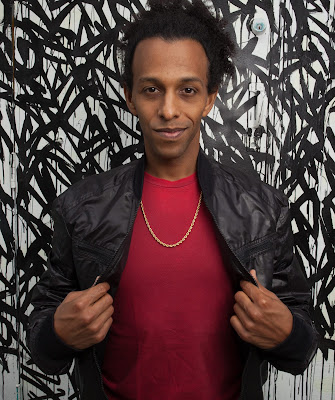Cadence, Rhythm, Flow: An Interview with Vietgone Composer Shammy Dee Part One
By Elspeth Sweatman
What’s your favorite thing about Vietgone?
It’s good writing. I love the comedy of it. At first, the premise of the play—a love story based during the Vietnam War—didn’t sound like something I would relate to, but I found myself really caring for these characters and hoping that it would all work out, which obviously it did because Qui exists. When I first read the raps and heard them, I was like, “Oh cool. Qui’s a head, a hip-hop head.” If you’re a fan of hip-hop culture, you’ll catch the writer’s subtle nods and winks to hip-hop artists like JAY-Z. And that’s a dope moment. It pulls you into the play.
How did you go about creating the music for this production?
Vietgone composer Shammy Dee began performing at a young age, but it was in junior high school that he discovered his medium: hip-hop and the smooth turntables of the DJ deck. Since releasing his debut album Transcripted Thoughts in 2006, Shammy Dee has produced and performed on many other music projects, such as DJing for top brands including Louis Vuitton, Jimmy Choo, and Burberry, as well as for celebrities including Mary J. Blige, Michael Bublé, and the Kardashians. In anticipation of Vietgone’s hip-hop takeover this Thursday, we sat down with Shammy Dee to chat about his process and the inherent energy of hip-hop. This is Part One.
 |
| DJ and hip-hop artist Shammy Dee. Photo by Robbie Jeffers. |
It’s good writing. I love the comedy of it. At first, the premise of the play—a love story based during the Vietnam War—didn’t sound like something I would relate to, but I found myself really caring for these characters and hoping that it would all work out, which obviously it did because Qui exists. When I first read the raps and heard them, I was like, “Oh cool. Qui’s a head, a hip-hop head.” If you’re a fan of hip-hop culture, you’ll catch the writer’s subtle nods and winks to hip-hop artists like JAY-Z. And that’s a dope moment. It pulls you into the play.
How did you go about creating the music for this production?
Over the course of a couple weeks, I read through the play multiple times, making notes about the impulses that I had, ideas that I thought could fit. Then I created multiple versions, at least three passes—if not more—of each song. What was interesting was when I showed these versions to Jaime [Castañeda, Vietgone's director], he gravitated toward my initial impulses, the passes that are very organic, with not a lot of synthesizers or samples. So we’re leaning toward acoustical instruments: drums, guitars, strings. When we grouped all the passes we liked together and listened back, we found the common thread to them was the organic feel.
Hip-hop makes it more accessible. The play definitely stands on its own—the writing is that strong—but music has a sneaky way of connecting people who wouldn’t connect otherwise. Hip-hop also gives the show an energy that you wouldn’t get if it was a traditional play. With hip-hop theater, songs can either create additional context or expand a moment. You can dig deeper into an emotion with a song, rather than saying “I’m upset.” Music can create that feeling, just like a movie score does. These songs in Vietgone pull you in because, just like with Hamilton and other hip-hop theater pieces, you’re experiencing storytelling in a different way.
Vietgone runs through April 22 at A.C.T.’s Strand Theater. Click here to purchase tickets. Join us at The Strand this Thursday, March 1 for an evening of hip-hop music, culture, and conversation. Enjoy discounted drinks and live music mixed by DJ Shammy Dee beginning at 6 pm, and a postshow panel featuring director Jaime Castañeda, playwright Qui Nguyen, DJ Shammy Dee, and hip-hop historian Jeff Chang. Want to learn more about the hip-hop in Vietgone? Order a copy of Words on Plays, A.C.T.'s in-depth performance guide series.
 |
| Composer Shammy Dee. Photo courtesy Shammy Dee. |
What does hip-hop add to Vietgone?
Hip-hop makes it more accessible. The play definitely stands on its own—the writing is that strong—but music has a sneaky way of connecting people who wouldn’t connect otherwise. Hip-hop also gives the show an energy that you wouldn’t get if it was a traditional play. With hip-hop theater, songs can either create additional context or expand a moment. You can dig deeper into an emotion with a song, rather than saying “I’m upset.” Music can create that feeling, just like a movie score does. These songs in Vietgone pull you in because, just like with Hamilton and other hip-hop theater pieces, you’re experiencing storytelling in a different way.
Vietgone runs through April 22 at A.C.T.’s Strand Theater. Click here to purchase tickets. Join us at The Strand this Thursday, March 1 for an evening of hip-hop music, culture, and conversation. Enjoy discounted drinks and live music mixed by DJ Shammy Dee beginning at 6 pm, and a postshow panel featuring director Jaime Castañeda, playwright Qui Nguyen, DJ Shammy Dee, and hip-hop historian Jeff Chang. Want to learn more about the hip-hop in Vietgone? Order a copy of Words on Plays, A.C.T.'s in-depth performance guide series.

